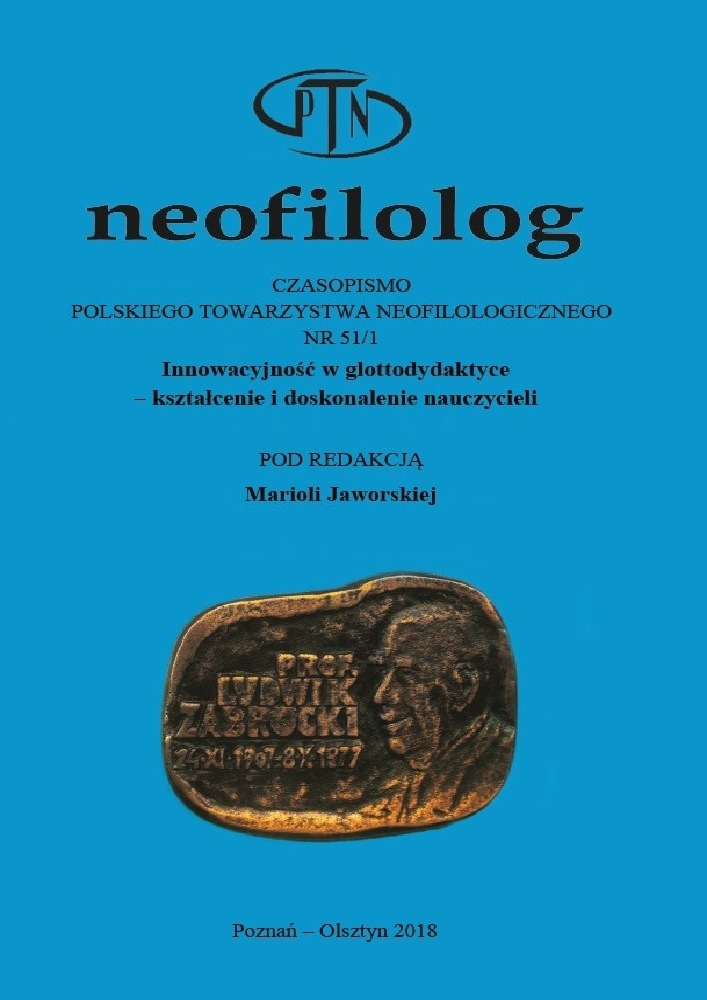Résumé
Innovation in language education, just as in any other discipline, is connected with changes whose primary goal is to make the process of language learning/language teaching more efficient. Examples of such innovations include, for instance, task based instruction, computer assisted language learning or the use of portfolio as a means of assessment.
Innovation implies a new, qualitatively different perception of the language learning/ language teaching process, roles of teachers and learners, use of materials etc., hence it is believed to constitute a challenge for language teachers and their professionalism. The present article is an attempt to answer the question whether and to what extent the language teaching profession is actually prepared to deal with innovation.
Références
Carless, D. 2013. „Innovation in language teaching and learning”. (w:) The Encyclopedia of Applied Linguistics. (red. C. A. Chapelle). DOI: 10.1002/9781405198431.wbeal0540.
England, L. 1998. „Promoting effective professional development in English Language Teaching (ELT)”. English Teaching Forum, vol. 36, no 2: 18-23.
Komorowska, H. 1999. „Successful teaching: How to achieve it, how to assess it”. Network, vol. 2, no 2: 3-9.
Komorowska, H. i Kiely, R. 1998. „Quality and impact – the evaluation agenda”. (w:) Innovations and outcomes in English language teacher education. (red. P. J. Melia). The British Council, Poland: The PRINCE Project, s. 15-38.
Markee, N. 1997. Managing curricular innovation. New York: Cambridge University Press.
Markee, N. 2001. „The diffusion in innovation in language teaching”. (w:) Innovation in English language teaching. A reader. (red. D. R. Hall i A. Hewings). London: Routledge, s. 118-126.
Schleicher, A. 2016. Educating for innovation and innovation in education. http://oecdeducationtoday.blogspot.com/2016/09/educating-for-innovation-and innovation.html.
Schratz, M. 2013. What is a “European teacher”? A discussion paper. European Network on Teacher Education Policies (ENTEP). http://www.see-educoop.net.education_in/pdf/workshop/tesee/documenti/european-teacher.pdf. DW 05.05.2013.
Schulz, R. 1994. Twórczość pedagogiczna. Warszawa: Instytut Badań Edukacyjnych.
Sergeant, S. 2001. „CALL innovation in the ELT curriculum”. (w:) Innovation in English language teaching. A reader. (red. D. R. Hall i A. Hewings). London: Routledge, s. 240-249.
Smak, E. 1997. Z zagadnień innowatyki pedagogicznej. Opole: Wydawnictwo Uniwersytetu Opolskiego.
Ur, P. 1997. „The English teacher as professional”. English Teaching Professional, July, Issue 8: 3-5.
Widdowson, H. G. 2004. „A perspective on recent trends”. (w:) A history of English language teaching. (A. P. R. Howatt i H. G. Widdowson). Oxford: OUP, s. 353-372 (chapter 21).
Zawadzka, E. 2004. Nauczyciele języków obcych w dobie przemian. Kraków: Oficyna Wydawnicza „Impuls”.
Licence
© Krystyna Droździał-Szelest 2019

Ce travail est disponible sous licence Creative Commons Attribution - Pas de Modification 4.0 International.
Auteurs :
Les auteurs de textes acceptés pour publication dans la revue Neofilolog sont tenus de remplir, signer et renvoyer à l'adresse de la rédaction, un accord sur l'octroi d'une licence gratuite pour les œuvres, avec obligation d'accorder une sous-licence CC.
En vertu de cet accord, les auteurs des textes publiés dans la revue Neofilolog accordent à l'Université Adam Mickiewicz de Poznań une licence non exclusive et gratuite et permettent l'utilisation de la sous-licence Creative Commons Attribution-NoDerivatives 4.0 International (CC BY-ND 4.0).
Les auteurs se réservent le droit de disposer librement de l'œuvre.
Utilisateurs :
Les utilisateurs d'Internet intéressés ont le droit d'utiliser les œuvres publiées à partir de l'année 2017 sous réserve des conditions suivantes :
- reconnaissance de la qualité d'auteur - l'obligation de fournir des informations sur la qualité d'auteur, le titre, la source (liens vers l'œuvre originale, DOI) et la licence, ainsi que l'œuvre distribuée ;
- sans créer d'œuvres dérivées - l'œuvre doit être conservée dans sa forme originale, p. ex. les traductions ou les interprétations ne peuvent être distribuées sans le consentement de l'auteur.
Tous les textes publiés sont soumis au droit d'auteur.
Autres :
L'Université Adam Mickiewicz de Poznań se réserve le droit à la revue dans son ensemble (mise en page, forme graphique, titre, conception de la couverture, logo, etc.).
.

